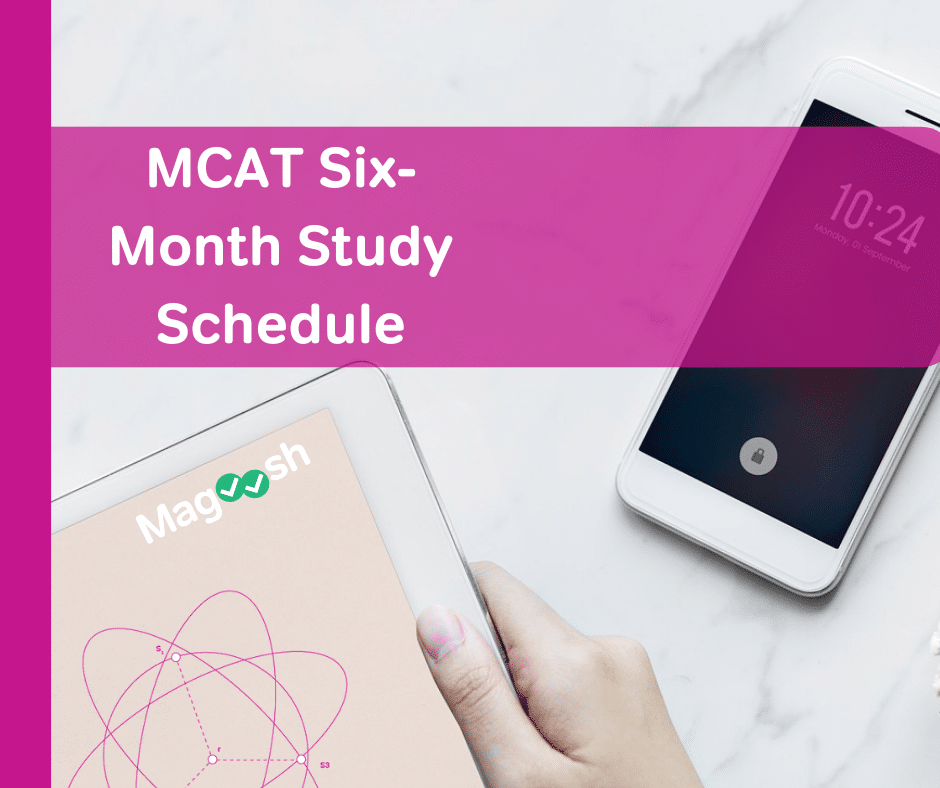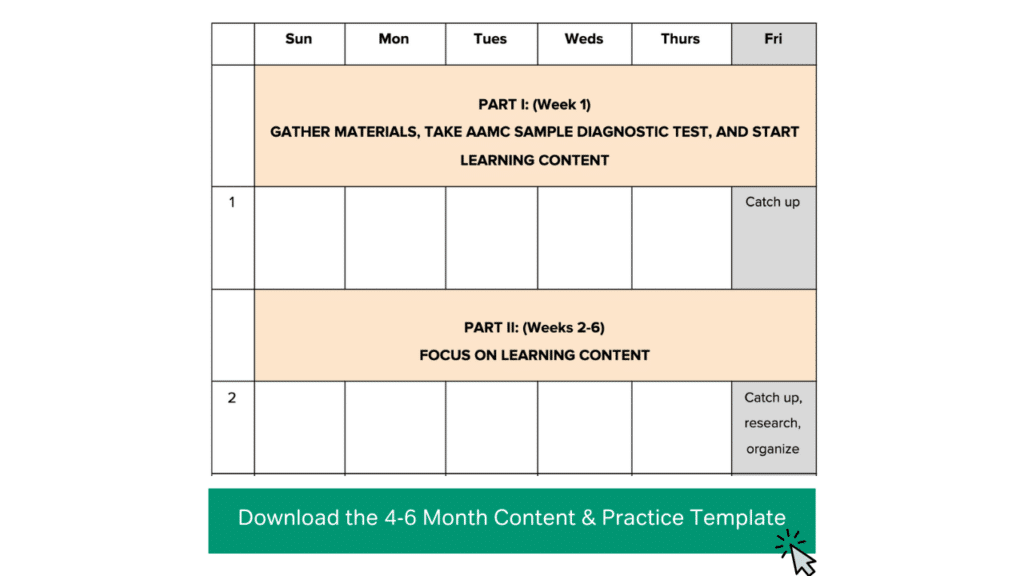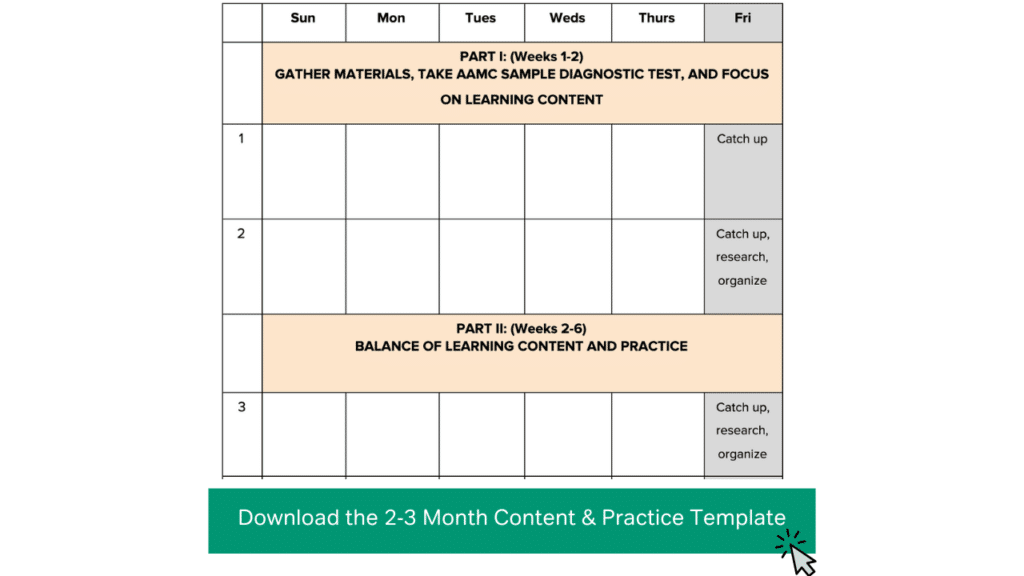
Wondering how to study for the MCAT? The MCAT study schedules listed on this page will help you make the most of your time and Magoosh subscription. In each study plan, you’ll find lesson recommendations, practice test links, and MCAT study tips to match your allotted study time.
A shorter MCAT schedule is most likely going to demand more hours per day and more days per week. If your study schedule is longer, you’ll have more flexibility with the pace at which you want to study. That said, we try and make sure we give our students a variety of study plans so every student finds one that suits their availability–even if you only have 1 week to prepare for the MCAT!
Check out the different study schedules below (and check back in the future for any updates!)
Table of Contents
- Finding the Ideal MCAT Study Schedule
- Most Popular MCAT Study Schedules
- MCAT Study Schedule Templates: Building Your Own MCAT Self-Prep Study Plan
- Other Magoosh MCAT Study Schedules
- A Final Word
Finding the Ideal MCAT Study Schedule
We’re super excited to have lots of MCAT study plans to share with you. But let’s face it: the ideal MCAT study schedule will look different from person to person. So how do you choose the plan that’s right for you?
The first thing to do is to take a diagnostic MCAT to see where your skills currently are and evaluate where they need to be for the schools you want to apply to. Then, look at your application deadlines.
Finally, evaluate factors that may require you to take more study time before your MCAT test date. Here are a few:
- Target vs. actual scores: If you have a larger point gap between where you are and where you want to be, this is a great reason to choose a longer study plan.
- Language ability: If English is not your first language, this will likely increase the amount of time you’ll need to study for the MCAT.
- Content retention: How long ago did you take relevant coursework that will appear on the MCAT? If it’s been a while since you had, for example, a biology course, or if organic chemistry went in one ear and out the other, you’ll want to add a few weeks or months to your study time.
- Testing experiences: Do you love standardized tests, or do you have test anxiety or other issues that make them more difficult for you? The less the idea of a standardized test appeals to you, the longer you should give yourself to prepare (it’ll get easier, we promise!).
Taking all of these factors into consideration should give you a rough idea of which MCAT study schedule below is right for you.
![]()
Most Popular MCAT Study Schedules

6 Month MCAT Study Plan
[printable version]
In this study plan, you’ll study 6 days a week, for about 2-4 hours per day (or 12-24 hours per week). You’ll cycle through each major substantive area every 2-3 weeks. In addition to videos, flashcards, and MCAT practice questions, you’ll also practice reading skills, sample CARS passages, and productivity and study habits. This is a great schedule if you work part-time or go to school.

3 Month MCAT Study Plan
[printable version]
In this study plan, you’ll study 6 days a week, 3-5 hours per day. This gives you thorough coverage of the material during your MCAT preparation. You’ll visit most substantive areas weekly, which gives you consistent exposure to each scientific discipline and ensures that you don’t over/understudy the areas. There’s also time for condensing notes and evaluating study habits.
Build Your Own MCAT Study Plan (MCAT Study Schedule Templates)
Are you looking for more freedom in designing your own MCAT study schedule? Then we have the thing for you! We’ve created these free, downloadable MCAT study schedule templates based on our MCAT expert’s recommended study styles. Check them out below!
How to Create an MCAT Study Plan
- See how long you have to study for the MCAT. Like our pre-built MCAT study plans, you’ll first want to follow these steps to evaluate your skills and see if you need more time to study. (Don’t forget about other events or considerations happening in your life too!) Once you have an idea, choose from one of our 4-6 Month or 2-3 Month MCAT Study Plan Templates.
- Decide where to focus most of your time. The templates below are structured so you spend more time on reviewing content or practice questions. But if you’re not sure where to start, or need to study both equally, we also have an MCAT study planner that gives you a good balance of both review and practice.
- Choose your topics and work backwards from your test date. We’ve compiled a list of all the MCAT topics provided by the AAMC. Add the topics you’ll be studying on each day, working backwards from your test date up until your first week of study. If you prefer to gradually ramp up your studying, then the days, weeks, and month leading up to the exam should be where you devote the most time. You may also allow more time to focus on areas where you’re weakest, set aside a few hours to study up about the test day process, or give yourself regular rest days.
- Get started! Any little bit you can do today will help. Good luck!
- 4-6 Months MCAT Study Schedule Templates (15-20 hours/week)
- 2-3 Months MCAT Study Schedule Templates (30 hours/week)
Other Magoosh MCAT Study Schedules
2 Month Study Plan
This 2 month MCAT study schedule is designed for students with a rapidly approaching exam date who can devote at least 25-30 hours per week towards watching lessons, reviewing content, answering practice questions, and honing CARS skills. You still encounter every topic on the MCAT, but you won’t have as much time to learn the nuances, condense your notes, or review your answers on practice exams. This schedule contains assignments 6 days per week, and each day is very dense. Therefore, you’ll see that the 6th day of the week is often set aside to catch up on any materials you missed during days 1-5. Despite the time crunch, you still get a rest day each week. One unique aspect of this schedule is that you will review flashcards nearly every day, which facilitates rapid memorization.
1 Month Study Plan
Studying for the MCAT in 1 month takes serious focus and dedication, but many busy students are still able to increase their MCAT scores significantly. (Trust us, we hear from these delighted students!) In this 1 month MCAT study schedule, you will review every major area of the MCAT in only 4 weeks at a rate of about 30-40 hours per week. You’ll review lessons, take practice tests, and use flashcards, and still get a rest day most weeks.
1 Week Study Schedule
If you only have 1 week to prepare for the MCAT, you might be feeling a little overwhelmed! This study schedule will help you organize your time and give you a solid basis for boosting your score. The plan centers around two practice tests and the AAMC question bank, which you’ll use to zero in on your weaker areas while refreshing your knowledge of your stronger ones.
![]()
A Final Word on Using MCAT Study Schedules
No matter where you currently are, you can reach your MCAT goals with enough time and practice. By selecting the MCAT study plan that best fits your needs and your schedule, you’re setting yourself up for success!
Meanwhile, check out our MCAT Question of the Day post for regular, steady practice—new every day of the month!
If you’re feeling stressed about starting your MCAT prep, we’re here for you—check out our video on how to manage pre-med anxiety with mindfulness. We hope this resource helps, and wish you happy studying!







Leave a Reply